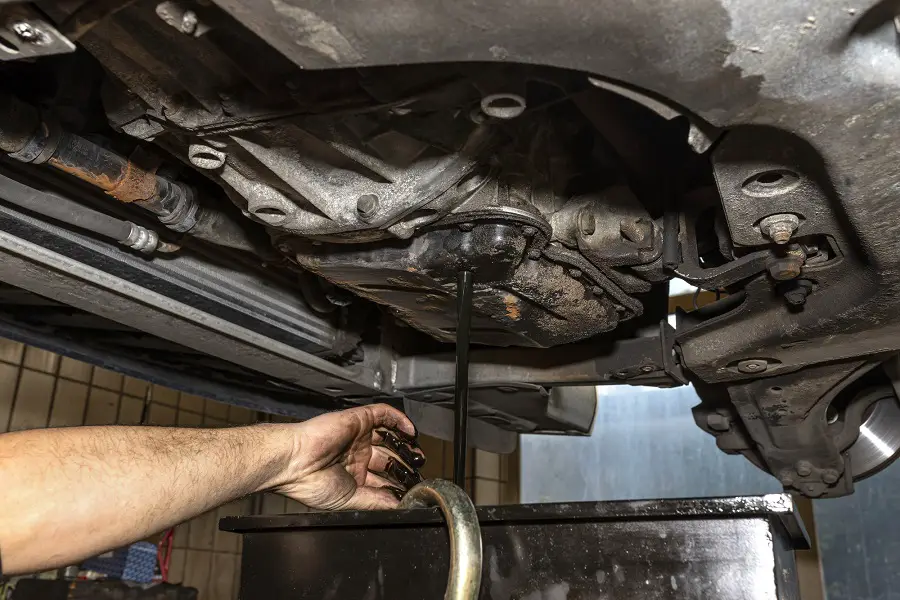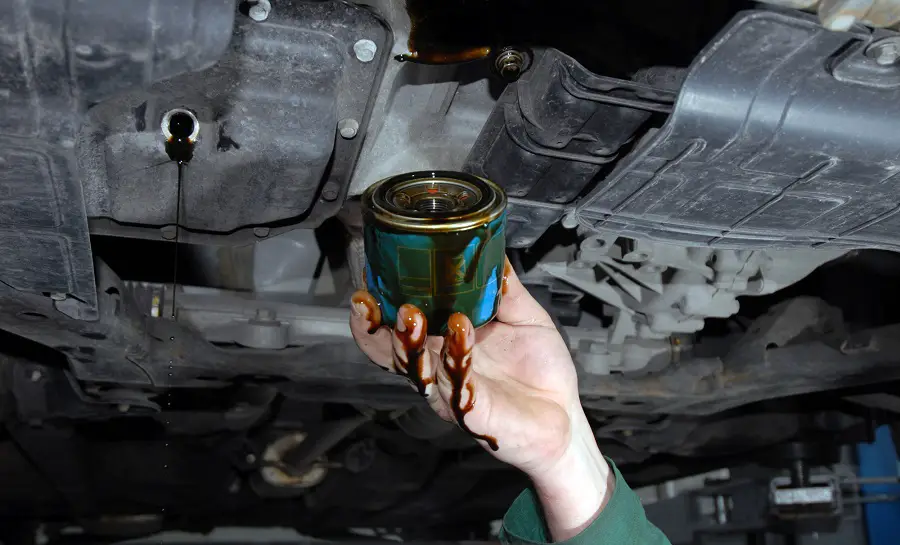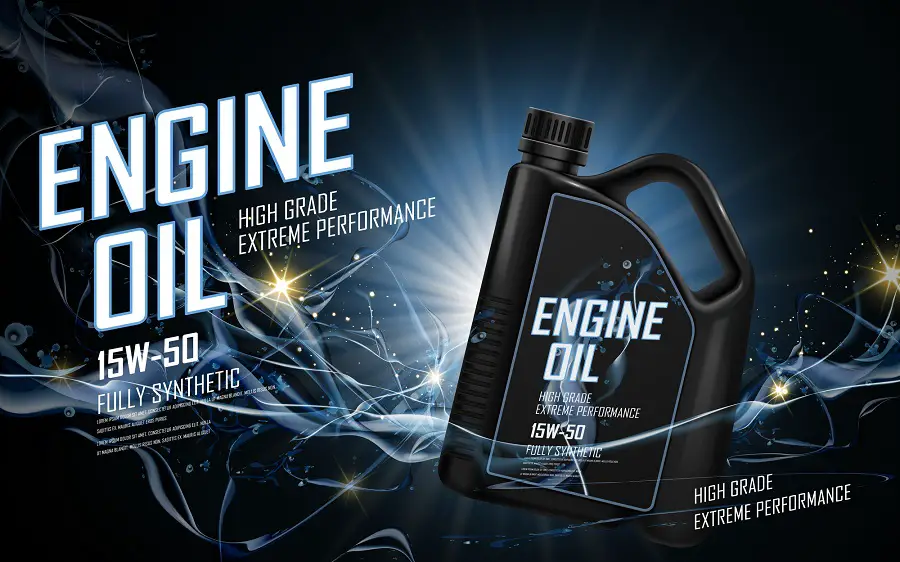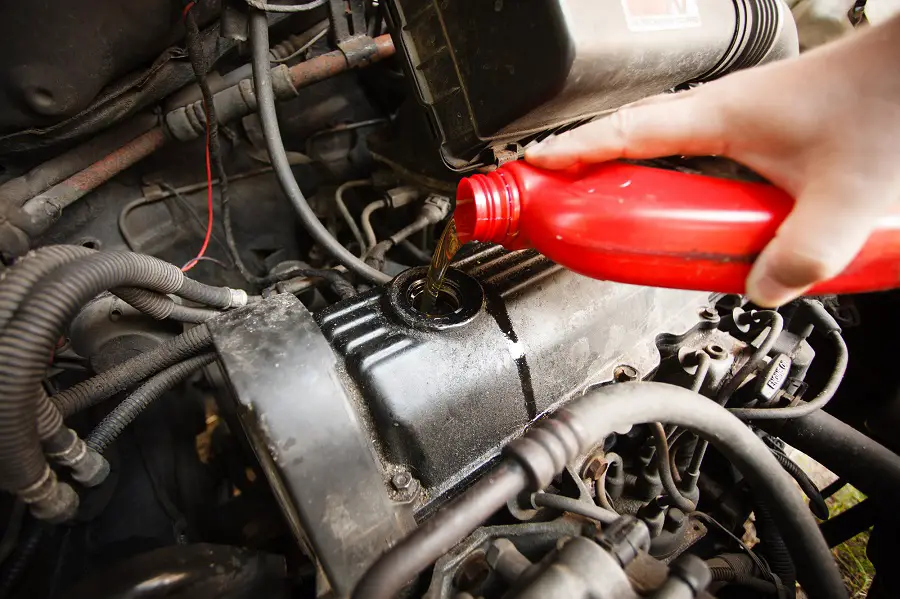It’s almost embarrassing to write this for the world to see, but when I was younger we had a barrel where we burned our trash. Near the barrel was a hole in the ground that was full of oil.
And we put it there.
This is where we would change our motor oil. There were ramps on either side of the hole so we could drive up and get under the various vehicles we had.
We lived in the middle of nowhere in New Mexico, and it was the early 1980’s, remember – but that doesn’t really excuse what we did.
It would have been great, at the time, to learn the proper way to dispose of used oil. Fortunately, that knowledge was gained a few years later in shop class.
But it’s worth sharing here:
The best way to dispose of used motor oil is to take it to a recycling center. The oil recycling center can collect enough oil to send it off to be restored and resold. Most auto parts stores and service centers will take used oil and ship it to certified collection centers for the recycling process.

There are right and wrong ways to do most things when it comes to cars. Most things are on a spectrum of right and wrong ways to do them.
Proper handling & disposal of used motor oil only has a few ways to do it right.
Is There a Right Way For How to Get Rid of Old Motor Oil?
Having a used motor oil disposal method in place is absolutely crucial for both the individual and the environment. That’s because motor oil can be very hazardous, and improperly disposing of it can cause dangerous environmental damage.
At the same time, however, we don’t want to dump our used motor oil into a recycling bin or even down the drain as we would with soapy water while doing our dishes.
Not only is this because oil is hazardous, but also because engine oil can be recycled. The base oil that makes up conventional multi-weight oil retains most of its properties even after use in a car.
The additives, that give the oil its desirable properties, are what break down and cause oil to go bad (we explained oil weight & how it’s made here).
While motor oil is recyclable, it should only be recycled by professionals who know how to treat used motor oil while adequately cleaning and sanitizing it before reusing it in another engine.
Remember that we don’t want to mix our used motor oil with other substances. If we do so, the recycling center will likely not be able to accept (or recycle) our used oil. We discuss “contaminated oil” below – for now, know that you shouldn’t deposit oil that has been mixed with any other fluids.
The last thing you should consider is dumping it down the storm drain, digging a hole in the ground or trying to flush it down your utility sink (even if you follow it with gallons of water, it’s still a bad idea)!
Why Should You Recycle Used Oil?
Did you know that motor oil doesn’t really go bad, only the additives break down and it becomes unstable and loses the properties that we bought it for in the first place? Motor oil can be used many times over. It can be recycled, cleaned, and used again if it gets dirty.
Used oil is an important source of energy that powers our cars, trucks, buses, trains, planes, boats, lawnmowers, tractors, generators, etc.
Sadly, it’s also one of the most common types of waste found in landfills. When you recycle used oil, it helps reduce pollution from trash going into landfills. Plus, when we reuse old oil instead of throwing it away, we save money on buying new fuel.
Ultimately, as gearheads, we should make efforts to not damage the environment. While I don’t exactly prescribe to the notion that man-made gasses are causing “global warming”, I still am not naive enough to think that we should actively do harm to the planet.
We shouldn’t. We should practice conservation and protection of the planet where we can.
This is one of the primary reasons to recycle our motor oil – it conserves a non-renewable and valuable resource and it shows that we’re being good stewards (and it keeps the cost of oil down and keeps politicians from taxing auto parts to “save the planet”)
It’s similar to how hunters practice conservation when harvesting animals (okay, I’ll get off my soapbox now).
Where Can I Drop Used Oil for Recycling?
We should bring our used motor oil to a recycling center or a service station that will recycle it for you. How long you can store your used oil before it needs to be recycled depends on the type of storage container you have, but the general rule of thumb is that if we are not able to fit another oil change worth of oil in the container, then it’s time to take it in for recycling.
We can usually find a recycling center in our area by searching online or asking local repair shops. For example, in my city, the local dump also recycles used oil. So it’s easy (and free) to take it to the landfill to recycle the oil and take advantage of their recycling program.
At this point, you might be wondering what happens to the old motor oil once it reaches its final recyclable destination. The answer is that almost all of it is recycled.
So how is it recycled? A primary component of motor oil is a type of base oil called a Group I Base Stock.
These oily substances are typically made from petroleum and natural gas byproducts. This means that once the recyclers have collected enough old motor oil to make a significant volume of Group I Base Stock, they can use them to create brand new lubricants for engines.
Even if your municipality doesn’t offer any recycling or waste disposal guidelines for motor oil, it’s still important not to illegally dispose of used motor oil by putting it down our drain or in the trash.
That’s because no matter how clean we think we got it before disposing of it with the rest of our household trash, it still contains heavy metals and other substances that can contaminate our water supply.
In addition to the fact that we could be risking a fine or even jail time if we illegally dump used motor oil, and get caught.
Another convenient reason to dispose of used motor oil is that it can make you some money. While not available in all areas, there are actually recycling facilities out there that buy old motor oil.
If you find one of these locations, it’s worth the effort to collect your oil after every change. You may even start a collection of oil from your Shadetree Mechanic buddies – you don’t have to let them know you’re getting paid to recycle their used motor oil.
Plus, in this case, allowing it to go to waste is like throwing away money!
Even if your municipality doesn’t accept used motor oil recycling at the curb, many recycling centers will come around and pick it up from our garage or driveway – saving us time and money while keeping our planet healthy.
Can You Recycle Contaminated Oil?
What if you break your block and you get antifreeze and water in your oil? Or, you accidentally pour transmission fluid or power steering fluid into your engine?
This would contaminate your motor oil.
Sadly, most oil recycling centers will not accept your used oil if it has been contaminated with water, gas, antifreeze, brake fluid, transmission fluid or anything other than oil.
However, if you mix conventional and synthetic motor oil, you should be fine to recycle it.
If you do find yourself with contaminated oil, you can ask your local center for the location where you can take it for proper disposal. Most of the time this is at a “hazardous materials” collection center.
What Do I Do with my Oil When I Change It?
If you change your own oil in your car, you might be wondering what to do with our oil. The best thing is to get a drip pan and oil storage container. Most retail used oil storage containers can hold between 10 and 20 quarts of bad oil.
A couple of good ones are the Lumax Drainmaster or the FloTool Dispos-Oil Recycle Jug.
That means that after about three or four oil changes, you’ll need to take the container to the local oil recycling center and dump it in the oil recycling bin or take it to the parts shop for disposal.
Just make sure that we store the oil in a case that is meant for oil storage in the meantime. The last thing we want is to have oil leaking into our garage from a container that wasn’t rated for oil in the first place.
A lot of people I know don’t have a “fancy” oil collection container and instead use a used plastic milk jug to collect the used oil. This can work so long as you rinse it well before the first use and don’t keep it too long. I’ve seen these jugs start to “sweat” and leak oil if left too long.
This leaves a mess on the oil changer’s shop floor when it happens. So don’t wait until you have gallons of motor oil saved up before you take it to the oil collection centers.

What About Recycling Used Oil Filters?
When you get an oil change or when you change your oil yourself, the oil filter should always be replaced. The filter will be full of old oil. The same stuff you’re dumping from your oil pan and taking to be recycled.
So what do you do with the old filter?
If we want to recycle our oil filter, we have to make sure we remove the old filter properly, then bring it to a collection center for recycling.
You can either bring your used oil filters into a store that sells motor oil and lubricants or you can drop them off at most recycling centers. If we do the first one the people in charge can dispose of them properly. And if your area doesn’t have any stores near us with proper disposal facilities for automotive fluids, you can do the latter.
Even if your old motor oil and filters didn’t come from a commercial oil change business, it’s still good not to throw them away. Some areas now offer household hazardous waste recycling services for common non-recyclable materials like used motor oil and oil filters.
If you’re in a bind and can’t find a center that will take used filters, you can drain the filter as best you can then take the empty oil filter to a hazardous waste center for disposal.
Full Circle; Can I Bury Used Oil?
So it’s clear I messed up when I was younger. If you’d have asked me this question then, I would have said, “Sure, bring your car over and use my ‘pit’ while you’re at it!”
But clearly, there’s a better answer to whether or not you can bury used oil:
No, definitely not. Burying oil in the ground is a bad idea and fortunately, it has become a rare and frowned upon used oil disposal method, but it is still one that some individuals attempt.
The problem with burying our used oil is that it can leach into the ground and contaminate water supplies. This can be harmful to both animals and plants. Not only that, but it is illegal in most areas of the world.
Motor oil is different from crude oil. It comes from deposits that are below the water table. If we pour it on the ground, it will kill plants and the roots of trees. The chemicals will also seep into the water table and pollute the water (bad if well water is used or we are near a lake or river).
We can get in trouble if we dump things in the US and it goes into the ground. We might need to pay for removing the soil and getting it treated. Sometimes, this is very expensive, so we do not want to do it. If we dump enough stuff so that people’s health is affected, then more legal issues will happen to us, and people will be suffering because of us as well.
Can you Burn Used Oil?
My uncle’s construction shop had an oil furnace that was designed specifically to burn old motor oil. He lived in an area in the northern United States and experienced long, cold winters. He also had an abundance of used oil in his mechanic shop from all of his vehicles, machinery and equipment.
So he burned his oil in the furnace.
Was this bad and can you do it now?
If your furnace is designed to burn used oil, and has the proper scrubbing and filtering exhaust system, you can use it. It’s a great way to heat a large shop and dispose of oil at the same time.
Of course, if you can get paid by a recycling center to take it there, you should do that and use that money to buy a radiant heat tube heater.
As I said before, the goal with used oil disposal is to do no harm to the planet.
If you use one of these “bad ways” to get rid of your oil, you may find yourself in a very slippery situation.






